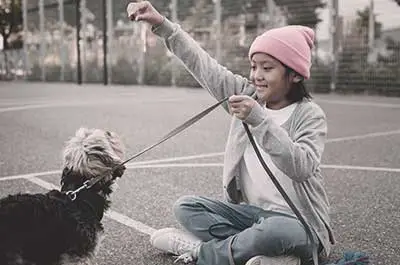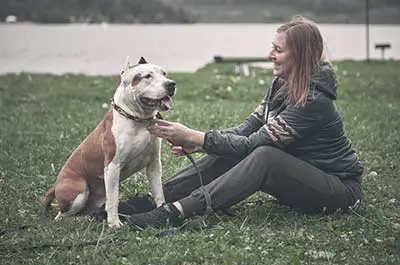Dog biting is a common problem that can have several causes. If your dog is biting, it’s important to determine the underlying cause and take corrective action. In this blog post, we’ll discuss some of the most common reasons dogs bite and offer advice on correcting the behavior. Stay safe and enjoy reading!
Understand why your dog is biting.

The first step in correcting any behavior is understanding why your dog is doing it. There can be many reasons behind a dog’s biting, including fear, aggression, excitement, or frustration. Once you know what’s motivating your dog’s biting, you can start to correct the behavior.
If your dog is biting out of fear, you’ll need to work on building its confidence. This can be done through positive reinforcement such as treats and praise and by gradually exposing your dog to new situations. If your dog is biting out of aggression, you’ll need to consult with a professional behaviorist to help you correct the problem.
In some cases, your dog may be biting out of excitement or frustration. If this is the case, you’ll need to provide plenty of exercise and training to help your dog release pent-up energy. You may also need to adjust your behavior around your dog to avoid provoking it.
Determine what type of biter your dog is.
Not all dogs bite for the same reasons. Some dogs are “soft biters,” meaning they only use their teeth as a warning. These dogs may be more likely to nip at your heels or jump up on you. If your dog is a soft biter, you can correct the behavior by teaching it to “speak” or “quiet” on cue.
Other dogs are “hard biters,” meaning they use their teeth to inflict actual pain. If your dog falls into this category, you’ll need to be especially careful and take steps to correct the behavior immediately. You may need to consult with a professional behaviorist or trainer to help you do this.
Learn how to read your dog’s body language.
To correct your dog’s biting behavior, you’ll need to be able to read its body language. This will allow you to determine when your dog is about to bite and take corrective action.
Common signs that a dog is about to bite include baring its teeth, growling, and snarling. If you see your dog exhibiting any of these behaviors, it’s important to take action immediately.
For example, if your dog is growling, you can distract it with a toy or treat. If it’s baring its teeth, you may need to back away until it calms down. It’s important never to try to force yourself on a dog that is showing signs of aggression.
Take corrective action.

Once you’ve determined why your dog is biting, it’s time to take corrective action. This will vary depending on the cause but may include obedience training and behavior modification therapy.
If your dog is biting out of fear, you’ll need to start by teaching it basic obedience commands such as sit, stay, and come. This will help you gain control over your dog and ensure that it obeys your commands. You’ll also need to provide plenty of positive reinforcement when your dog behaves well.
If your dog is biting out of aggression, you’ll need to take a more hands-on approach. This may include Behavior Modification Therapy, which is a type of training that helps to change the way your dog behaves. In some cases, the vet can prescribe something to help control your dog’s aggression.
If your dog is biting out of excitement or frustration, you’ll need to provide plenty of exercise and training. You may also need to adjust your behavior around your dog to avoid provoking it. Be sure to praise your dog when it behaves well and provide treats when it completes a training task.
Be consistent with your corrections.
Whatever the underlying cause of your dog’s biting, it’s important to be consistent with your corrections. If you only correct the behavior sometimes or only when it’s convenient for you, your dog will quickly learn that it can get away with biting. This will only make the problem worse in the long run.
You need to be firm and consistent with your corrections to train your dog properly. This may require some patience on your part, but it’s well worth it in the end.
With a little bit of work, you can correct your dog’s biting behavior and help it to live a happier, healthier life.
Be patient.
Changing your dog’s biting behavior can take time and patience. Don’t expect results overnight, and always be sure to take steps to protect yourself from being bitten. Stay safe and enjoy your furry friend!
It’s important to be patient and consistent when correcting biting behavior. It can take time and effort to change a dog’s bad habits, but it’s worth it in the end. With patience and perseverance, you can help your dog overcome their biting problem and have a safe and happy home.
Reward your dog for good behavior.
When your dog behaves well, be sure to praise it and give it a treat. This will help to reinforce the good behavior and make sure that it continues. A well-behaved dog is a happy dog, and that’s what we all want!
One of the best ways to correct bad behavior is to reward your dog for good behavior. When your dog exhibits desirable behaviors such as not biting, make sure to praise them and give them a treat. This will help your dog to associate good behavior with positive outcomes and make it more likely to continue behaving well.
Be proactive in preventing biting incidents.

Biting can be a difficult behavior to correct, but it’s important to be proactive in preventing biting incidents from happening in the first place. This means being aware of your dog’s body language and taking steps to avoid provoking it.
It’s also important to be familiar with basic obedience commands. If your dog is obedience trained, you’ll be able to control it better and prevent it from biting. Always be aware of your surroundings and your dog’s behavior to ensure a safe and happy home. This is especially relevant when there are children or other animals around.
Seek professional help if needed.
Some cases of biting may require professional help. If your dog is aggressive or has other behavioral problems, it’s best to seek the assistance of a qualified behaviorist or trainer. They will be able to help you to better understand and control your dog’s behavior.
In some cases, professional help may be needed to correct a dog’s biting behavior. If you’re unsure what to do or if your dog’s biting is getting out of control, it’s best to seek professional help. A qualified trainer or veterinarian can help get your dog’s behavior back on track.
Biting can be a difficult behavior to correct, but it’s important to be proactive in preventing biting incidents from happening in the first place.
Stay safe.
It’s important to remember that despite their playful demeanor, dogs are still animals and can bite if provoked. If a dog ever bites you, even if it’s just a nip, it’s important to seek medical attention. Dog bites can easily become infected and lead to serious health complications.
If your dog has a history of biting, it’s important to take extra precautions. Make sure that any guests in your home are aware of your dog’s behavior and take steps to avoid being bitten. If your dog is aggressive towards other animals, it’s best to keep them away from other pets.
If you have children, it is important to teach them how to behave around dogs and what to do if they’re a bit. It’s also important to keep an eye on your children when they’re around dogs, as even the friendliest dog can become agitated and bite if provoked.
Changing your dog’s biting behavior can take time and patience. Don’t expect results overnight, and always be sure to take steps to protect yourself from being bitten. Stay safe and enjoy your furry friend!
Conclusion.
By following these tips, you can help to correct your dog’s biting behavior and have a safe and happy home. Be patient, consistent, and proactive to achieve the best results.
Biting is a common problem among dogs and can be caused by various things. If your dog is biting, it’s important to be patient and consistent with your corrections. You may also need to seek professional help if the problem is severe. With time and effort, you can help your dog overcome its biting problem and have a safe and happy home. I hope this article was helpful for you. Thanks for reading!

Meet Brenda Tillman: your go-to expert in Cognitive Behavioral Therapy! Not only is she a seasoned therapist, but she’s also a passionate mom blogger who never misses a beat. Dive deep into her insightful blogs, backed by her extensive coursework in Parenting Skills, Learning, and Education. Brenda’s heartwarming family – a son, two daughters, and their adorable pets – often take center stage in her writings. From parenting hacks and relationship tips to health & fitness nuggets, Brenda has been enlightening her readers for over half a decade. Stick around, and you’re bound to discover gems from a mom who wears many hats with grace!
Reviewed By: Joanna Perez and Marcella Raskin
Edited By: Lenny Terra
Fact Checked By: Gabrielle J. Smith
Photos Taken or Curated By: Matthew Mansour